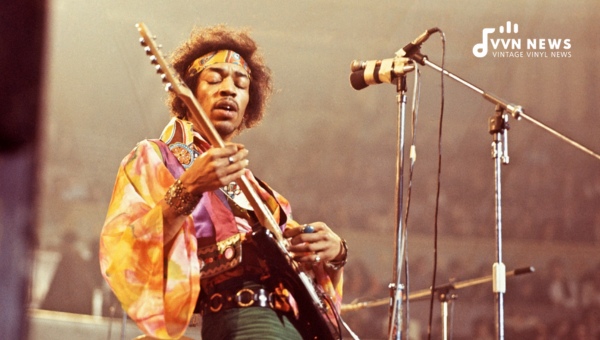Music has long served as a powerful conduit of expression. To resonate with every strum, to feel every riff deep in your core, is what music is about, and few musical domains do this quite as effectively as guitar playing.
The best guitarists of all time have instilled in us a sense of awe and admiration; their artistry crosses continents, genres, and generations.
A talented guitarist can transcend mere melody to evoke emotion. They become the heart of the band, driving the rhythm and setting the mood with their captivating licks and robust rhythms.
From blues to rock, from jazz to country, these virtuosos have redefined boundaries and continue to inspire budding musicians.
Join me as we celebrate the maestros who have graced us with unforgettable riffs and solos that reverberate in our hearts till today.
Best Guitarists of All Time

When it comes to guitar playing, certain legendary figures have left an indelible mark on the music industry.
Their distinct styles, technical prowess, and undeniable stage presence have catapulted them to the status of musical icons.
In this comprehensive list, we will take a closer look at some of the greatest guitarists of all time, highlighting their contributions and influence.
Jimi Hendrix (1942–1970)
Jimi Hendrix is widely regarded as one of the most influential guitarists in the history of modern music.
Born in 1942, his innovative style and virtuoso playing revolutionized rock music.
Known for his wild performances and mastery of the electric guitar, Hendrix pushed the boundaries of what was possible with the instrument.
Hendrix’s unique blend of blues, rock, and psychedelic sounds allowed him to create a distinctive sound that captured the imagination of millions.
His album Are You Experienced is considered a masterpiece, showcasing his exceptional skills on tracks like “Purple Haze” and “Foxy Lady.”
He was known for his use of feedback, distortion, and wah-wah pedals to create otherworldly tones.
Unfortunately, Hendrix’s career was tragically cut short when he died at the age of 27 in 1970.
Nonetheless, his impact on music continues to reverberate today, inspiring countless guitarists with his unparalleled talent and revolutionary approach to playing.
Eddie Van Halen (1955–2020)
Eddie Van Halen is another iconic guitarist who left an indelible mark on the world of rock music.
Born in 1955, Van Halen rose to prominence as the lead guitarist for the band Van Halen.
His innovative techniques and energetic playing style propelled him to legendary status.
Van Halen was known for his lightning-fast solos, intricate finger-tapping techniques, and artistic use of harmonics.
His ability to seamlessly blend hard rock riffs with catchy melodies set him apart from his peers. Songs like “Eruption” and “Hot For Teacher” exemplify his technical brilliance.
Tragically, Eddie Van Halen passed away in 2020 at the age of 65 after a battle with cancer.
He will always be remembered not only as an incredible guitarist but also as a true pioneer who pushed the boundaries of what could be achieved on the electric guitar.
Also Read: 15 Richest Guitarists In The World [Rock Stars Making Bank]
Slash
Slash, born Saul Hudson, is a renowned British-American guitarist who gained fame as a member of Guns N’ Roses.
With his signature top hat and flowing hair, Slash created an iconic image that perfectly matched his blues-infused, hard rock-playing style.
His time with Guns N’ Roses produced some of the most memorable guitar solos in rock history.
Tracks like “Sweet Child o’ Mine” and “November Rain” showcase his ability to create melodic and soulful solos that captivate listeners.
In addition to his work with Guns N’ Roses, Slash has also had a successful solo career and collaborated with various other artists.
His contributions to rock music have solidified his place as one of the greatest guitarists of all time.
David Gilmour
David Gilmour is best known for his work as the lead guitarist and vocalist for the legendary band Pink Floyd.
His melodic playing style and emotive solos have become hallmarks of Pink Floyd’s sound.
Gilmour’s ability to create atmospheric soundscapes through his guitar playing is unparalleled.
Tracks like “Comfortably Numb” and “Shine On You Crazy Diamond” exemplify his ability to evoke deep emotions through his expertly crafted solos.
Beyond Pink Floyd, Gilmour has also released successful solo albums, further showcasing his versatility and talent as a guitarist.
His contributions to progressive rock have left an indelible mark on the genre.
Eric Clapton
Eric Clapton is often referred to as “Slowhand” due to his smooth and deliberate playing style.
He gained prominence in the 1960s as a member of bands like The Yardbirds, Cream, and Derek and the Dominos. Clapton’s blues-influenced guitar playing became iconic in rock history.
Known for his impeccable technique, Clapton has the remarkable ability to convey raw emotions through his guitar.
Tracks like “Layla” and “Crossroads” are timeless classics that showcase his immense skill and soulful playing.
Clapton’s career spans decades, during which he has established himself as one of the most respected guitarists in the industry.
He has remained a source of inspiration for countless musicians, and his influence on rock music cannot be overstated.
Also Read: 25 Best Singers Of All Time [Voices That Made Music History]
Jimmy Page
Jimmy Page is a British musician, songwriter, and producer who rose to fame as the guitarist and founder of the legendary rock band Led Zeppelin.
Born in 1944, Page’s contributions to rock music have solidified his status as one of the greatest guitarists of all time.
Page’s innovative playing style, which incorporated elements of blues, folk, and heavy rock, set him apart from his contemporaries.
His use of iconic guitar riffs, intricate solos, and masterful use of effects pedals helped shape the sound of Led Zeppelin and influenced generations of guitarists to come.
One of Page’s defining characteristics as a guitarist is his ability to create a sense of dynamism within his songs.
From the driving force behind tracks like “Whole Lotta Love” to the delicate acoustic melodies in “Stairway to Heaven,” Page’s versatility shines through in every note.
After Led Zeppelin disbanded in 1980, Jimmy Page continued to make significant contributions to rock music through various projects and collaborations.
He remains an influential figure in the music industry and continues to inspire countless guitarists with his technical prowess and innovative approach to playing.
Alex Lifeson
Alex Lifeson is a Canadian musician best known as the guitarist for the progressive rock band Rush.
Born in 1953, Lifeson’s extraordinary talent and mastery of his instrument have earned him widespread recognition as one of the greatest guitarists in rock history.
Lifeson’s playing style encompasses a wide range of techniques and influences, including hard rock, progressive rock, jazz fusion, and classical music.
His ability to seamlessly blend complex chord progressions with intricate solos has set him apart from other guitarists.
Throughout Rush’s career spanning over four decades, Lifeson has consistently showcased his technical proficiency on tracks like “Limelight” and “YYZ.”
His use of dynamic rhythms and unconventional time signatures has made him a favorite among prog-rock enthusiasts.
In addition to his work with Rush, Lifeson has also released solo material and collaborated with other artists. His unique sound and creativity continue to inspire guitarists around the world.
Joe Walsh
Joe Walsh, born in 1947, is an American guitarist, singer, and songwriter known for his work in the rock bands
The James Gang and Eagles. With his distinct guitar style and soulful playing, Walsh has left an indelible mark on the world of rock music.
Walsh’s blues-influenced guitar solos are characterized by their melodic sensibility and emotional depth.
The iconic guitar intro on “Life in the Fast Lane” or the fiery solo on “Rocky Mountain Way,” Walsh’s playing always leaves a lasting impression.
Beyond his technical prowess as a guitarist, Joe Walsh is also known for his songwriting abilities.
His contributions to hits like “Hotel California” and “Take It Easy” have cemented his place in rock history.
In addition to his work with bands, Joe Walsh has also enjoyed a successful solo career, releasing critically acclaimed albums that showcase his versatility as both a guitarist and songwriter.
His impact on rock music continues to be felt by music lovers worldwide.
Also Read: 19 Best-selling Albums Of All Time [Music’s Greatest Hits]
Brian May
Brian May, born in 1947, is an English musician best known as the guitarist for the legendary rock band Queen.
May’s unique playing style combines melodic phrasing with intricate harmonies, creating a sound that is instantly recognizable.
May’s use of layers of guitars and intricate arrangements brings depth and grandeur to Queen’s songs.
Tracks like “Bohemian Rhapsody” and “We Will Rock You” highlight May’s exceptional guitar talents, incorporating memorable solos and powerful riffs that have become iconic in rock history.
Apart from his contributions to Queen, Brian May has also pursued a successful solo career, releasing albums that showcase his versatility as both a guitarist and songwriter.
He has also played a significant role in raising awareness for various charitable causes.
May’s influence on rock music is immeasurable, and his contributions to the genre have made him one of the most respected guitarists in the industry.
His innovative playing style continues to inspire aspiring musicians worldwide.
Peter Green (1946–2020)
Peter Green, born in 1946, was an English blues rock guitarist and songwriter who played an integral role in shaping the British blues scene of the late 1960s.
With his soulful playing and emotive guitar solos, Green became known as one of the finest blues guitarists of his time.
Green’s work with Fleetwood Mac showcased his ability to blend blues with elements of psychedelic rock.
Tracks like “Black Magic Woman” and “Albatross” highlight his melodic approach to playing, as well as his ability to create memorable riffs.
Despite personal struggles later in his life, Peter Green’s legacy as a guitarist remains intact.
His contributions to the blues rock genre have influenced countless musicians, and his unique sound continues to resonate with listeners today.
Green passed away in 2020, but his talent and impact on music will not be forgotten.
He will always be known for the immense contribution he made to both British blues and rock music as a whole.
Keith Richards
Keith Richards is a legendary English guitarist best known as a founding member of the iconic rock band, The Rolling Stones.
Born in 1943, Richards played a pivotal role in shaping the sound of rock ‘n’ roll.
Richards is renowned for his raw and gritty guitar style, characterized by his use of open tunings, infectious riffs, and blues-inspired solos.
His distinctive rhythm guitar playing forms the foundation of many classic Stones songs.
Tracks like “Brown Sugar” and “Start Me Up” display his knack for creating catchy and timeless hooks.
In addition to his guitar skills, Richards is also an accomplished songwriter and has co-written many of The Rolling Stones’ greatest hits.
He has collaborated with various artists throughout his career, further expanding his musical influence.
Despite his rock ‘n’ roll lifestyle, Richards continues to captivate audiences with his enduring talent and unmistakable sound.
His combination of rhythm and lead guitar playing has solidified him as one of the most influential guitarists in rock history.
Also Read: 31 Rock Albums Of All Time [Relive The Golden Era Of Music]
Joe Perry
Joe Perry is an American guitarist best known as a founding member of the legendary band Aerosmith.
Born in 1950, Perry’s fiery and bluesy guitar playing helped define Aerosmith’s signature sound.
Perry’s ability to seamlessly blend blues licks with hard rock riffs sets him apart as a versatile player.
His melodic solos can be heard on hits like “Dream On” and “Sweet Emotion,” showcasing his ability to inject emotion into every note he plays.
Beyond Aerosmith, Perry has also pursued various solo projects and collaborations with other artists.
His distinctive style, characterized by expressive bends and dynamic phrasing, continues to inspire generations of guitarists.
With his memorable onstage presence and impeccable sense of tone, Joe Perry remains one of the most influential guitarists in the realm of classic rock.
Lindsey Buckingham
Lindsey Buckingham made a name for himself as the lead guitarist and vocalist for the renowned band Fleetwood Mac.
Born in 1949, his intricate fingerpicking style and unique approach to guitar playing set him apart from his peers.
Buckingham’s innovative use of alternate tunings and percussive fingerstyle techniques creates a rich and textured sound.
Tracks like “Big Love” and “Go Your Own Way” highlight his ability to layer complex guitar parts, resulting in captivating compositions.
Buckingham’s contributions to Fleetwood Mac’s success cannot be overstated.
His meticulous attention to detail in both his guitar playing and songwriting has solidified him as a true master of his craft.
Even outside of Fleetwood Mac, Buckingham’s solo work showcases his impeccable musicianship and ongoing commitment to pushing the boundaries of his artistry.
Rory Gallagher (1948–1995)
Rory Gallagher was an Irish blues guitarist known for his electrifying and soulful performances.
Born in 1948, Gallagher left an indelible mark on the world of blues rock with his stunning guitar work.
Gallagher drew inspiration from blues legends like Muddy Waters and BB King, infusing their influence into his fiery solos.
His improvisational style allowed him to unleash a raw energy on stage that captivated audiences around the world.
Throughout his career, Gallagher released numerous albums showcasing his virtuoso guitar playing.
Tracks like “Laundromat” and “Shadow Play” exemplify his dynamic technique and ability to blend traditional blues with rock influences.
Sadly, Rory Gallagher passed away in 1995 at the age of 47. However, he left behind a legacy as one of the greatest blues guitarists of all time, influencing countless musicians with his passionate performances and immense talent.
Also Read: 29 Best Musicals Of All Time [Experience The Magic Of Stage]
Carlos Santana
Carlos Santana is a Mexican-American guitarist known for merging rock, Latin music, jazz fusion, and blues into a unique sound that transcends genres.
Born in 1947, Santana has remained a prominent figure in the music industry for over five decades.
His fluid and melodic solos characterize Santana’s guitar playing. His distinctive tone, achieved through a combination of sustain and vibrant vibrato, has become instantly recognizable to music fans across the globe.
Standout tracks like “Black Magic Woman” and “Smooth” showcase Santana’s ability to infuse his Latin roots into his guitar playing.
His collaboration with various artists throughout the years highlights his versatility as a musician.
With his immense talent and spiritual approach to music, Carlos Santana continues to inspire generations of guitarists.
His contribution to the fusion of diverse musical styles has made him an influential figure in popular music.
George Harrison (1943–2001)
George Harrison, often overshadowed by his Beatles bandmates John Lennon and Paul McCartney, was an incredibly talented guitarist in his own right.
Born in 1943, Harrison’s contributions to the band went far beyond just playing the guitar.
He was responsible for writing some of the group’s most beloved songs, showcasing not only his songwriting prowess but also his guitar skills.
Harrison’s playing style incorporated elements of rock, folk, and Indian classical music, reflecting his deep spirituality and interest in Eastern philosophy.
His iconic guitar solos on songs like “While My Guitar Gently Weeps” and “Something” showcased his ability to create melodic and soulful lines that resonate with listeners.
After the breakup of The Beatles, Harrison embarked on a successful solo career.
His albums like All Things Must Pass highlighted his diverse musical influences and exceptional guitar playing.
Tragically, George Harrison passed away in 2001 after a battle with cancer. His contributions to music will forever, solidify his place as one of the greatest guitarists of all time.
Mark Knopfler
Mark Knopfler is best known as the lead guitarist and vocalist for the British rock band Dire Straits.
Born in 1949, Knopfler’s distinctive fingerpicking style and melodic solos became synonymous with the band’s sound.
Knopfler’s playing technique is rooted in blues and country influences. His intricate fingerpicking patterns on tracks like “Sultans of Swing” and “Money for Nothing” showcased his impeccable precision and control over the instrument.
In addition to his work with Dire Straits, Knopfler has had a successful solo career.
His ability to evoke emotion through intricate melodies has made him a revered guitarist among fans and fellow musicians alike.
Jeff Beck (1944–2023)
Jeff Beck’s contributions to the world of guitar playing are immeasurable.
Born in 1944, Beck has had a career spanning over six decades, during which he continually pushed the boundaries of what could be achieved with the instrument.
Beck’s playing style is marked by his innovative use of techniques such as feedback, bending, and whammy bar manipulation.
His solos on songs like “Cause We’ve Ended as Lovers” and “Freeway Jam” showcase his virtuosity and ability to create intricate yet soulful lines.
Throughout his career, Beck collaborated with numerous artists and explored various genres, including rock, blues, jazz fusion, and electronic music.
His constant experimentation and desire to push the limits of guitar playing have solidified his status as a true guitar legend.
Also Read: 20 Best Eq Pedals For Perfect Tone [Shape Your Guitar Sound]
Robert Johnson (1911–1938)
Robert Johnson is often hailed as the grandfather of the blues guitar. Born in 1911 in Mississippi, Johnson’s groundbreaking style revolutionized the genre and laid the foundation for generations of future guitarists.
Johnson’s mastery of fingerpicking and his emotive vocal delivery set him apart from other blues musicians of his time.
Songs like “Cross Road Blues” and “Sweet Home Chicago” are iconic examples of his delicate yet powerful technique.
Despite his tragically short life—Johnson passed away at just 27 years old—his influence on modern music cannot be overstated.
Countless artists have drawn inspiration from his unique style and heartfelt performances.
Kurt Cobain (1967–1994)
Kurt Cobain, frontman for the grunge band Nirvana, was not only a talented songwriter but also an accomplished guitarist.
Born in 1967, Cobain’s raw and energetic playing style perfectly complemented Nirvana’s angst-filled sound.
Aggressive power chords, dissonant melodies, and an unapologetic sense of rebellion characterized Cobain’s approach to guitar playing.
His ability to create catchy yet unconventional riffs on songs like “Smells Like Teen Spirit” and “Come as You Are” captivated audiences worldwide.
Tragically, Cobain’s life was cut short when he passed away in 1994 at the age of 27.
Nevertheless, his impact on alternative rock and his raw talent as a guitarist continue to inspire aspiring musicians to this day.
These incredible guitarists have left an indelible mark on the world of music with their extraordinary talent and creative genius.
Their contributions have shaped genres, inspired countless aspiring musicians, and cemented their place among the best guitarists of all time.
Robert Fripp
Robert Fripp is an innovative guitarist and composer best known for his work with the progressive rock band King Crimson.
Born on May 16, 1946, in England, Fripp’s unique playing style and dedication to pushing musical boundaries have cemented his status as a true guitar virtuoso.
Fripp’s distinctive sound can be attributed to his unconventional approach to playing.
He often utilizes complex guitar techniques such as polyrhythms, dissonant chords, and ambient effects to create layered and atmospheric compositions.
His meticulous attention to detail has earned him a reputation for being a perfectionist.
Throughout his extensive career, Fripp has collaborated with numerous artists including Brian Eno, David Bowie, and Talking Heads.
His notable works extend beyond King Crimson into the realm of solo projects and collaborations that showcase his versatility and creativity as a guitarist.
Also Read: 20 Best Boost Pedals In 2025 [Pump Up Your Guitar Performance]
John Frusciante
John Frusciante rose to prominence as the lead guitarist of the iconic rock band Red Hot Chili Peppers.
Born on March 5, 1970, Frusciante’s impressive guitar skills and unique blend of funk, punk, and psychedelic influences have left an indelible mark on the music world.
Frusciante’s playing style is characterized by his dynamic use of melodic riffs, incendiary solos, and a focus on improvisation.
His ability to seamlessly weave between different genres while maintaining his distinct sound showcases his mastery of the instrument.
Apart from his work with Red Hot Chili Peppers, Frusciante has also released several acclaimed solo albums that demonstrate his versatility as a musician.
These albums showcase his exploration of different genres such as electronic music and experimental rock.
Richard Thompson
Richard Thompson is a highly respected British folk-rock guitarist known for his intricate fingerpicking style and evocative songwriting. Born on April 3, 1949,
Thompson’s lyrical guitar playing has captivated audiences and earned him a devoted following worldwide.
Thompson’s unique blend of folk, rock, and Celtic influences is showcased in his extensive discography.
His ability to craft emotional and introspective songs is complemented by his technical prowess on the guitar.
His melodic solos and cascading fingerpicking patterns are a testament to his exceptional skill.
In addition to his successful solo career, Thompson’s collaborations with artists like Linda Thompson have further established him as a true legend of the folk-rock genre.
His contributions to music continue to inspire both aspiring musicians and seasoned guitarists alike.
Thurston Moore
Thurston Moore is renowned for his role as the guitarist and co-founder of the influential alternative rock band Sonic Youth.
Born on July 25, 1958, Moore’s unconventional approach to guitar playing has left an indelible mark on the music world.
Moore’s playing style incorporates elements of noise, punk rock, and avant-garde experimentation.
He utilizes various alternate tunings to create dissonant chords and angular rhythms.
His blend of dirty distortion, feedback-laden solos, and unconventional techniques make him stand out as a true non-conformist guitarist.
Apart from Sonic Youth, Moore has also released solo albums that further showcase his innovative approach to guitar playing.
These albums explore different sonic landscapes and push the boundaries of what can be achieved with the instrument.
Dick Dale (1937–2019)
Dick Dale, known as the “King of Surf Guitar,” was an American guitarist whose powerful playing style helped define the surf rock genre in the 1960s.
Born on May 4, 1937, Dale’s energetic performances and pioneering use of reverb revolutionized guitar music at the time.
Dale’s passionate approach to playing the guitar involved fast-paced tremolo picking, giving his solos a distinctive and energetic sound.
His use of Middle Eastern scales, percussive techniques, and staccato picking added a unique flavor to his surf rock compositions.
Songs like “Misirlou” and “Let’s Go Trippin'” exemplify Dale’s high-energy style and virtuosic guitar skills. His influence can still be heard in the music of many modern surf rock and rockabilly bands.
Despite Dick Dale’s passing in 2019, his legacy as a pioneer of surf rock continues to inspire guitarists around the world.
His technicality, showmanship, and innovative approach to playing will forever be etched in music history.
Also Read: 15 Best Tremolo Pedals [Add Vibrato To Your Guitar Sound]
FAQs about the Best Guitarists of All Time
Who is considered the greatest guitarist of all time?
The title of the greatest guitarist of all time is subjective and can vary depending on personal preferences, but many consider Jimi Hendrix to be one of the most influential and innovative guitarists in history.
What made Eddie Van Halen a legendary guitarist?
Eddie Van Halen’s exceptional skills on the electric guitar, his lightning-fast solos, and his innovative use of techniques like finger-tapping set him apart and solidified his status as a legendary guitarist.
How did Slash become a renowned guitarist?
Slash’s blues-infused playing style and his memorable guitar solos with Guns N’ Roses propelled him to fame and cemented his reputation as one of the greats in rock music.
What sets David Gilmour apart as a guitarist?
David Gilmour’s ability to create atmospheric soundscapes through his emotive guitar playing, combined with Pink Floyd’s profound lyrics, distinguishes him as a unique talent in the world of progressive rock.
Why is Eric Clapton considered one of the greatest guitarists?
Eric Clapton’s impeccable technique and soulful playing style have earned him a place among the greatest guitarists, with songs like “Layla” and “Crossroads” standing as timeless examples of his skill.
Conclusion
The world of music has been enriched by a multitude of extraordinary guitarists who have left an indelible mark on the industry.
From the groundbreaking innovation of Jimi Hendrix to the technical virtuosity of Eddie Van Halen, these guitarists have pushed boundaries and captured the hearts and minds of listeners worldwide.
The melodic stylings of David Gilmour or the blues-infused genius of Eric Clapton, there is no denying that these talented individuals have forever changed the face of guitar playing.
So let us celebrate these legends and continue to be inspired by their incredible artistry.








